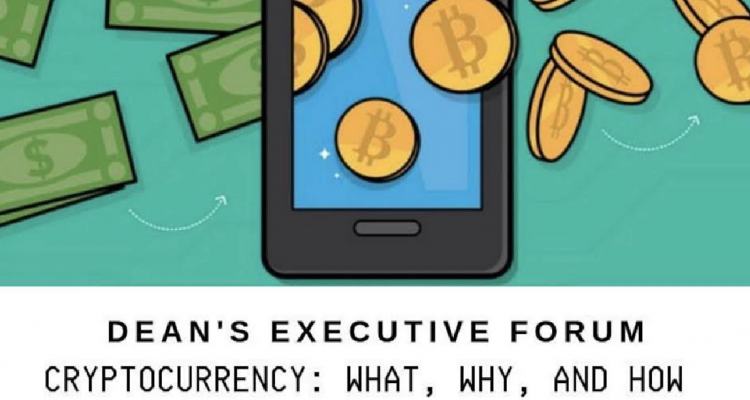Murray Stahl imagines a world where everybody can potentially have a basic universal income just by selling their data online, where there is no middleman between content creators and content and where a secure way of sharing money and completing transactions will be virtually impossible to hack. How will this world be possible?
Cryptocurrency.
Stahl is the co-founder, chief executive officer, chairman of the board and chief investment officer for Horizon Kinetics. He has over 30 years of investment experience, and oversees a variety of research on cryptocurrency. At the Dean’s Executive Forum at the Charles F. Dolan Business School on March 5th, Stahl discussed the development of cryptocurrency and its effect on our lives. Assistant Professor of Finance Michael Puleo moderated the event.
Stahl referenced Friedrich Hayek’s 1977 book “The Denationalization of Money,” which proposed to take the power of currency creation away from the federal government and banks and put it in the hands of people. Stahl admitted this idea was “totally impractical” because one would not be able to keep track of the amount of currencies- until the evolution of something called a blockchain. As Stahl explained, a blockchain is the mechanism by which people can independently validate the number of units of a currency that exists.
“If you know how many units of currency there are, if you know that is fixed, then you solve the problem of inflation. That’s why we need it,” Stahl said.
As Stahl said, blockchain is a ledger, a permanent summary of all individual transactions in a certain account, that millions of people will be able to access. Based on his research, Stahl theorizes that when people are all independently calculating transactions, all of these millions of ledgers will equal the same amount at the end of each ten minute period of time called block time.
“You incentivize people to constantly be vigilant, validating and verifying these transactions, because that’s how you get bitcoin- reward- your incentive for validating transaction,” said Stahl.
Cryptocurrency is safer than traditional methods of banking, Stahl said. In the world of blockchain, there is a ledger that repeats 1.5 million times. It would take an enormous amount of electric power, and someone would be identified quickly. The community would take action very quickly, because there would be so many people watching.
“I don’t believe it’s theoretically possible to hack a blockchain,” Stahl said.
Puleo asked about the future of cryptocurrency, Stahl explained that in the future, people will be able to see your data online, but they will not know the data belongs to you. They will be able to contact you via your “public key,” and you will be able to set a parameter- for example, “I won’t mind receiving a pop up advertisement if I receive 25 cents for each ad.” This would ensure a guaranteed revenue stream, Stahl explained.
In the future, cryptocurrency will eliminate the middleman. If you are a creator of content, instead of intermediaries receiving the bulk of the money, all the revenue will go directly to you.
Stahl also discussed Filecoin, a form of cryptocurrency which uses empty space in every individual’s hard drive. Everybody who owns a laptop has a hard drive with many gigabytes of storage capacity- most of which is empty. Filecoin will lease out the empty space in an individual’s hard drive to people who want to use this empty space. “Everybody with a laptop can become a revenue source,” Stahl said.
Stahl advises students looking to invest in cryptocurrency to remember that there is no minimum amount needed to invest. “Whatever amount of money one can afford to lose, that’s the amount one should invest.”


Leave a Reply